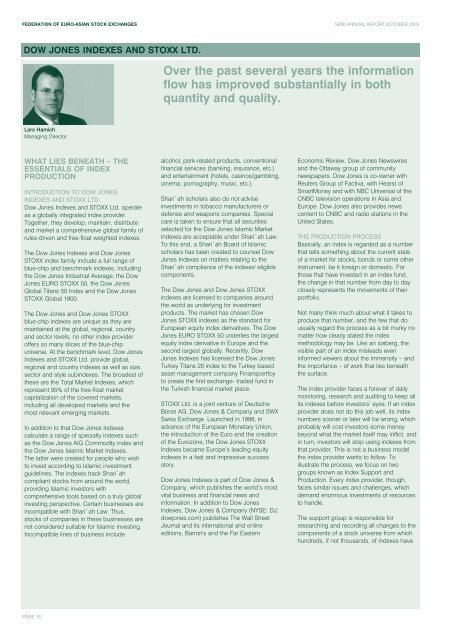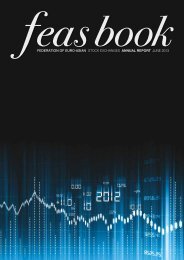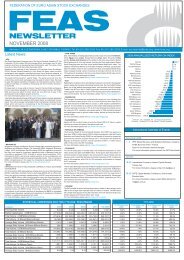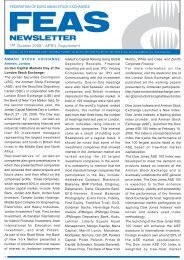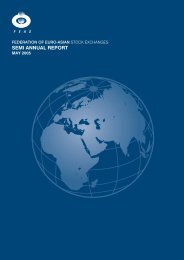Download - FEAS
Download - FEAS
Download - FEAS
You also want an ePaper? Increase the reach of your titles
YUMPU automatically turns print PDFs into web optimized ePapers that Google loves.
FEDERATION OF EURO-ASIAN STOCK EXCHANGES SEMI ANNUAL REPORT OCTOBER 2005<br />
DOW JONES INDEXES AND STOXX LTD.<br />
Lars Hamich<br />
Managing Director<br />
WHAT LIES BENEATH – THE<br />
ESSENTIALS OF INDEX<br />
PRODUCTION<br />
INTRODUCTION TO DOW JONES<br />
INDEXES AND STOXX LTD.<br />
Dow Jones Indexes and STOXX Ltd. operate<br />
as a globally integrated index provider.<br />
Together, they develop, maintain, distribute<br />
and market a comprehensive global family of<br />
rules-driven and free-float weighted indexes.<br />
The Dow Jones Indexes and Dow Jones<br />
STOXX index family include a full range of<br />
blue-chip and benchmark indexes, including<br />
the Dow Jones Industrial Average, the Dow<br />
Jones EURO STOXX 50, the Dow Jones<br />
Global Titans 50 Index and the Dow Jones<br />
STOXX Global 1800.<br />
The Dow Jones and Dow Jones STOXX<br />
blue-chip indexes are unique as they are<br />
maintained at the global, regional, country<br />
and sector levels; no other index provider<br />
offers so many slices of the blue-chip<br />
universe. At the benchmark level, Dow Jones<br />
Indexes and STOXX Ltd. provide global,<br />
regional and country indexes as well as size,<br />
sector and style subindexes. The broadest of<br />
these are the Total Market Indexes, which<br />
represent 95% of the free-float market<br />
capitalization of the covered markets,<br />
including all developed markets and the<br />
most relevant emerging markets.<br />
In addition to that Dow Jones Indexes<br />
calculate a range of specialty indexes such<br />
as the Dow Jones AIG Commodity index and<br />
the Dow Jones Islamic Market Indexes.<br />
The latter were created for people who wish<br />
to invest according to Islamic investment<br />
guidelines. The indexes track Shari`ah<br />
compliant stocks from around the world,<br />
providing Islamic investors with<br />
comprehensive tools based on a truly global<br />
investing perspective. Certain businesses are<br />
incompatible with Shari`ah Law. Thus,<br />
stocks of companies in these businesses are<br />
not considered suitable for Islamic investing.<br />
Incompatible lines of business include<br />
PAGE 16<br />
Over the past several years the information<br />
flow has improved substantially in both<br />
quantity and quality.<br />
alcohol, pork-related products, conventional<br />
financial services (banking, insurance, etc.)<br />
and entertainment (hotels, casinos/gambling,<br />
cinema, pornography, music, etc.).<br />
Shari`ah scholars also do not advise<br />
investments in tobacco manufacturers or<br />
defense and weapons companies. Special<br />
care is taken to ensure that all securities<br />
selected for the Dow Jones Islamic Market<br />
Indexes are acceptable under Shari`ah Law.<br />
To this end, a Shari`ah Board of Islamic<br />
scholars has been created to counsel Dow<br />
Jones Indexes on matters relating to the<br />
Shari`ah compliance of the indexes' eligible<br />
components.<br />
The Dow Jones and Dow Jones STOXX<br />
indexes are licensed to companies around<br />
the world as underlying for investment<br />
products. The market has chosen Dow<br />
Jones STOXX indexes as the standard for<br />
European equity index derivatives. The Dow<br />
Jones EURO STOXX 50 underlies the largest<br />
equity index derivative in Europe and the<br />
second largest globally. Recently, Dow<br />
Jones Indexes has licensed the Dow Jones<br />
Turkey Titans 20 index to the Turkey based<br />
asset management company Finansportfoy<br />
to create the first exchange- traded fund in<br />
the Turkish financial market place.<br />
STOXX Ltd. is a joint venture of Deutsche<br />
Borse AG, Dow Jones & Company and SWX<br />
Swiss Exchange. Launched in 1998, in<br />
advance of the European Monetary Union,<br />
the introduction of the Euro and the creation<br />
of the Eurozone, the Dow Jones STOXX<br />
Indexes became Europe’s leading equity<br />
indexes in a fast and impressive success<br />
story.<br />
Dow Jones Indexes is part of Dow Jones &<br />
Company, which publishes the world’s most<br />
vital business and financial news and<br />
information. In addition to Dow Jones<br />
Indexes, Dow Jones & Company (NYSE: DJ;<br />
dowjones.com) publishes The Wall Street<br />
Journal and its international and online<br />
editions, Barron's and the Far Eastern<br />
Economic Review, Dow Jones Newswires<br />
and the Ottaway group of community<br />
newspapers. Dow Jones is co-owner with<br />
Reuters Group of Factiva, with Hearst of<br />
SmartMoney and with NBC Universal of the<br />
CNBC television operations in Asia and<br />
Europe. Dow Jones also provides news<br />
content to CNBC and radio stations in the<br />
United States.<br />
THE PRODUCTION PROCESS<br />
Basically, an index is regarded as a number<br />
that tells something about the current state<br />
of a market for stocks, bonds or some other<br />
instrument, be it foreign or domestic. For<br />
those that have invested in an index fund,<br />
the change in that number from day to day<br />
closely represents the movements of their<br />
portfolio.<br />
Not many think much about what it takes to<br />
produce that number, and the few that do<br />
usually regard the process as a bit murky no<br />
matter how clearly stated the index<br />
methodology may be. Like an iceberg, the<br />
visible part of an index misleads even<br />
informed viewers about the immensity – and<br />
the importance – of work that lies beneath<br />
the surface.<br />
The index provider faces a forever of daily<br />
monitoring, research and auditing to keep all<br />
its indexes before investors’ eyes. If an index<br />
provider does not do this job well, its index<br />
numbers sooner or later will be wrong, which<br />
probably will cost investors some money<br />
beyond what the market itself may inflict, and<br />
in turn, investors will stop using indexes from<br />
that provider. This is not a business model<br />
the index provider wants to follow. To<br />
illustrate the process, we focus on two<br />
groups known as Index Support and<br />
Production. Every index provider, though,<br />
faces similar issues and challenges, which<br />
demand enormous investments of resources<br />
to handle.<br />
The support group is responsible for<br />
researching and recording all changes to the<br />
components of a stock universe from which<br />
hundreds, if not thousands, of indexes have


